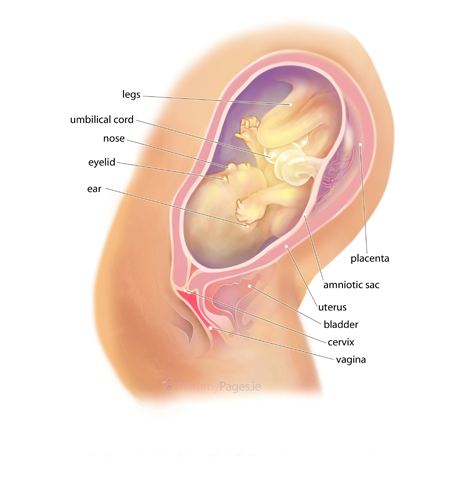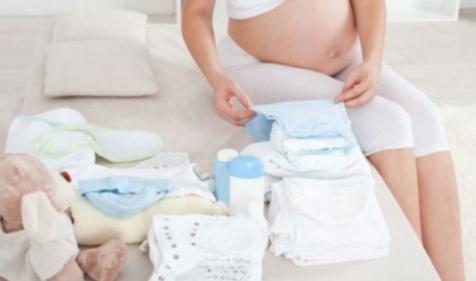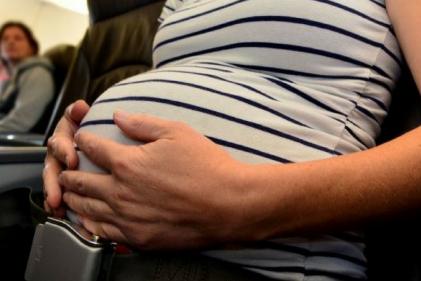At week 32 of your pregnancy your baby is continuing to make preparations to exist in the outside world. She is much bigger this week and her growing body could start to cause you to have some rather annoying symptoms in your last few weeks of pregnancy.
Your Baby this Week
Your baby is now around the size of a squash at about 40cm (16 inches) long and weighing in at between 1.1 to 1.7kg (2.5 to 3.8lbs).
She is getting so big that she does not have much room to move around anymore. As she kicks and wiggles now, you may not feel the movements as much as you did in the last few weeks. If you are concerned, do kick counts. Ten kicks per hour are considered normal and less than ten kicks in two hours is not normal. If you feel less than ten kicks in two hours, contact your doctor right away.
In week 32, your baby is continuing to add layers of fat beneath her skin. Her internal organs are functioning daily and practicing for that big day. At this time, all of her senses are fully functional. She can see light, she can hear your voice, and she can feel and react to your touch. Her sense of smell and taste are also functioning at this time.
The bones of your baby’s little body are now mostly hardened. Her skull, however, will be less hard in order to make delivery easier. The skull is made up of several plates that have soft spots between them. These soft spots are called fontanelles. The fontanelles allow the plates to flex during birth, allowing the baby’s large head to fit through the birth canal easier. After birth, your baby’s skull plates will realign and the process of ossification, or hardening, will continue until your child is around 2 years of age. At that time, the fontanelles will be closed.
Your Body this Week
In week 32 of your pregnancy, the top of your uterus is now about 13cm (5 inches) higher than your belly button. Your internal organs are being pushed aside to make room for your baby. This could cause more intense heartburn and constipation from now until you deliver.
As the uterus pushes your stomach up, the duodenal flap that normally stays closed could be pushed open. This causes the heartburn. To minimize heartburn, you should try to eat smaller, more frequent meals and avoid some of the things that make heartburn worse. Spaghetti sauce and pizza are known culprits. You can also take antacids but it is recommended that you talk to your doctor first.
Constipation can get worse and the level of progesterone in your body increases. If you are plagued with constipation, drink lots of fluids and make sure that you diet includes fibre. If your bowel movements are too painful, talk to your doctor. He can recommend stool softeners that would be safe to take during your pregnancy. Stool softeners should be used sparingly as your body can actually become reliant on them.
Some other symptoms that you may be continuing to experience this week are indigestion, breathlessness, and fluid retention. If you are experiencing fluid retention, you should know the signs of preeclampsia and know what to do if you recognise them.
Preeclampsia is a condition in which the mum’s blood pressure rises to a dangerous level. The cause of preeclampsia is not known, although it is most common during first pregnancies. Preeclampsia occurs in approximately 3 to 4 percent of all pregnancies and it is the number one reason for low birth weight, premature birth, and still birth.
When preeclampsia advances it becomes eclampsia which can lead to seizures, coma, and even death if not treated. The signs of preeclampsia are high blood pressure, swelling of the hands and face, weight gain that is rapid and abnormal, and protein in the urine. There could also be vision problems, pain in the abdomen, and headaches. If you notice any of these symptoms, contact your doctor right away.
Pregnancy Tip
As your pregnancy progresses, you may want to think about taking a tour of the hospital where you are going to deliver. On your tour, make sure to ask the following questions:
- Is there any paperwork required that you can fill out before you arrive?
- Where should you park and where should you go?
- What is available to help you get through your labour? (exercise balls, DVD players, stereos, televisions, etc.)
- Is there a lactation nurse available once your baby is born?
- Can you view the labour and delivery rooms?










